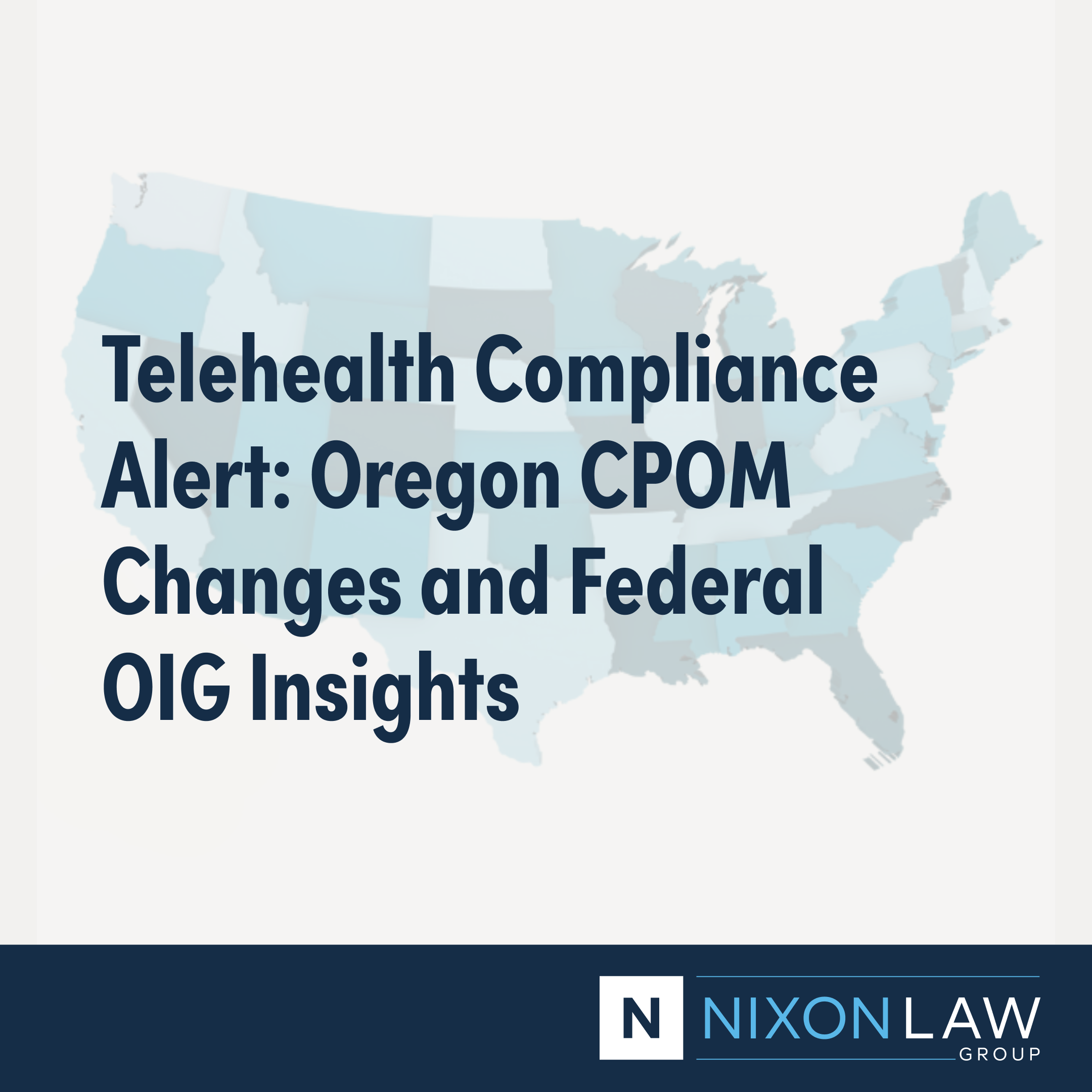Learn how Oregon’s new CPOM law and a recent OIG opinion impact MSO-PC models, and how telemedicine providers can stay compliant and scale responsibly.
Read MoreCMS proposes expanded reimbursement for digital mental health devices and seeks public input on broader digital therapeutics coverage. Comments due Sept. 12.
Read MoreExplore how the 2026 Medicare Physician Fee Schedule and the Big Beautiful Bill are shaping the future of Food as Medicine (FaM). Learn about proposed changes to MNT reimbursement, new federal and state laws, and key compliance issues for FaM and virtual food care innovators.
Read MoreThe 2026 Medicare Physician Fee Schedule proposes key changes to remote monitoring reimbursement—including new codes and a shift in data requirements. Learn what’s at stake and why stakeholders should act before the September 12, 2025 comment deadline.
Read MoreCMS is exploring major shifts in Medicare reimbursement policy for virtual care and chronic disease management. This article breaks down the 2026 RFIs and what policymakers, providers, and digital health innovators need to know before the September 12, 2025 comment deadline.
Read MoreCMS’ 2026 MPFS rule proposes major changes to RPM, APCM, and DMHT codes. See how digital health innovators can prepare and weigh in on key policies.
Read MoreAI is reshaping healthcare—but for innovators building AI/ML-enabled software as a medical device (SaMD), staying compliant with FDA regulations is just as critical as building great tech. The FDA’s evolving Total Product Lifecycle (TPLC) approach, new transparency principles, and guidance on Predetermined Change Control Plans (PCCPs) are reshaping the path to market.
Read MoreScaling a healthcare AI company? Learn the top legal strategies for growth-stage digital health companies—from FDA SaMD analysis and HIPAA compliance to state AI laws and AI governance.
Read MoreThe DEA has delayed implementation of two major teleprescribing rules until December 31, 2025, citing stakeholder concerns about patient access and pharmacy burden. While current pandemic-era flexibilities remain in place, the future of telehealth prescribing, especially for opioid use disorder treatment, remains uncertain as regulators weigh next steps.
Read MoreNew York is the latest state to introduce its own health privacy law, the NY Health Information Privacy Act (NYHIPA), signaling a growing trend of state-level regulations extending beyond HIPAA. If enacted, NYHIPA will impose strict requirements on how businesses—both inside and outside the healthcare industry—collect, process, and share consumer health data, making compliance a priority for many organizations.
Read MoreOIG’s increased oversight of Remote Patient Monitoring (RPM) and Chronic Care Management (CCM) has led to a surge in Medicare audits, with a focus on documentation, medical necessity, and compliance with billing requirements. To stay compliant, organizations should ensure clear documentation, conduct proactive compliance assessments, and seek legal guidance when responding to audits.
Read MoreThe removal of semaglutide from the Drug Shortage List will have a significant impact on the way telehealth practices and compounding pharmacies handle this medication. With the normal FDA restrictions on compounding set to take effect once again, practices and pharmacies need to be aware of the deadlines and regulatory requirements that come with this change.
Read MoreNow is the time for action. Those who embrace uncertainty, focus on enduring industry needs, and leverage technology to enhance the system will lead this next era of healthcare innovation.
Read MoreExplore how state laws are shaping the future of AI in healthcare, focusing on transparency, consumer rights, and algorithmic fairness. As regulations evolve, healthcare AI innovators must adapt to ensure compliance and equitable outcomes in a multijurisdictional landscape.
Read MoreDiscover how AI is transforming healthcare in 2025, driving advancements in clinical care and value-based models while navigating a rapidly evolving regulatory landscape.
Read MoreDiscover the top trends and opportunities for digital health innovators in 2025, from AI adoption and value-based care to regulatory shifts and cybersecurity challenges. These insights from Nixon Law Group will help you navigate the year ahead.
Read MoreExplore how venture debt can offer healthcare innovation companies non-dilutive capital to fuel growth, bridge equity rounds, and scale operations, while navigating key legal and financial considerations to maximize value.
Read MoreCMS has finalized the APCM codes for 2025. See what this means for primary care and digital health companies.
Read MoreSee what the final Medicare Physician Fee Schedule for 2025 has to say about Digital Mental Health Treatment
Read MoreLearn about the Office of Inspector General’s new report around remote patient monitoring and the key areas where it misses the mark.
Read More



















